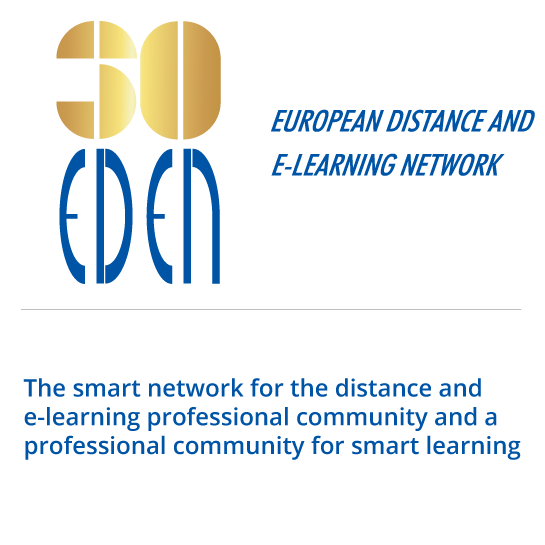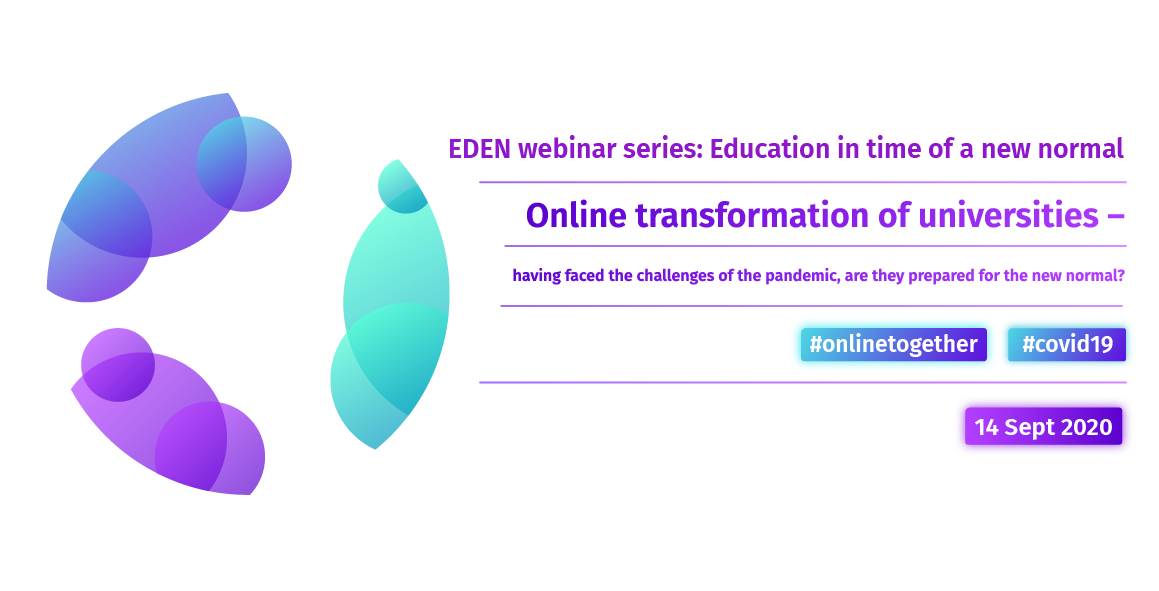Monday, 14 September 2020, 17:00 CEST
EDEN webinar
WATCH THE RECORDING VIEW THE PRESENTATIONS
Registered webinar participants will be awarded by EDEN open badges.
Description
As a result of the COVID-19 pandemic last March, universities worldwide faced the need to move all their classes to an online environment overnight, in order to ensure continuation of their teaching and learning activities. Institutions that had already ventured onto the path of online education realised this transformation much more quickly than those who were less prepared. Others made the transition more modestly, only beginning to take the first steps into online education. In a remarkable short time, courses and exams across the globe moved online, ensuring that universities did not close but rather adapted to the new situation and by doing so managed to save the remainder of the academic year.
Having overcome the initial impact of the pandemic and having moved beyond immediate crisis management, university leaders are now taking the time to reflect on the lessons learned, to set new strategies for the future, and to fully prepare their institutions for the new academic year. Although some continue to hope that students will soon return to classrooms, others see the COVID-19 crisis as a catalyst for educational organisations to implement online teaching and learning systematically and to thus offer a better quality of education in this age of the new normal. What are the key leadership decisions that organisational leaders must make in creating their vision for the future? What short-term and long-term strategies are needed? How can leadership ensure a smooth transition to the online setting and create the necessary infrastructure for training teachers, and implementing new teaching methods and redesigned curricula? How can universities manage their transition to online while improving the quality of teaching and learning? These are some of the questions we will be addressing in the first two webinars of the EDEN webinar initiative Education in time of a new normal (September 14 and 21).
Aimed at policy makers and organisational leaders and management, but also for all those working in education, these webinars will provide practical insights and tips from well-known experts, leaders, and practitioners in the field of e-learning and online learning.
Join the sessions and participate in discussions, where you will get the ideas you need to turn your vision for the future into actionable steps. Get the answers you need for smoothly leading your organisation in transforming your curriculum to online and ensuring high quality teaching and learning.
Questions that will be discussed in this webinar:
- Online and distance education is like a student sitting on a three-legged stool. The three legs are: 1. Learning Materials; 2. Logistics and Administration; & 3. Student Support. If any of these legs is weak the student will fall (fail):
- How do you provide good student support through online/distance methods?
- What are the keys to good logistics and administration?”
- How can universities respond to the crisis caused by the pandemic and seize the opportunities for faster and meaningful digital transformation?
- What teaching and evaluation methods can we use successfully in both online and face to face environments?
- In order for higher education institutions to be successful in their transition to online and distance education they should be able not only to adjust their methodologies and procedures, but to transform their teaching and learning cultures.
- In this perspective, what specific criteria should be meet in order to assure the quality of online/distance programmes and courses?
- how should teachers be trained and supported in order to teach effectively in an online environment?
Moderator
 Sandra Kučina Softić
Sandra Kučina Softić
EDEN President
University Computing Centre SRCE, Croatia
Sandra Kučina Softić is the Assistant Director for Education and User Support at the Zagreb University Computing Centre (Croatia). She is also the Head of the E-learning Centre and the Head of the Office for E-learning at the University of Zagreb. Her work is focused on monitoring and fostering e-learning in Croatian higher education and providing support and advice to institutions, teachers and students in implementation of new technologies in learning and teaching. She was appointed Croatian representative in ET2020 Working group on Digital Skills and Technologies (2016-2018) and in ET2020 Working group on Digital Education: learning, teaching and Assessment (2018-2020). In 2018 she was appointed member of European Education and Training Expert Panel.
Her field of interest is strategic decision making related to e-learning and distance education, quality assurance, educational technologies and open education and open educational resources. She has been involved in a number of projects (national and international) related to these fields and she also actively presents at international conferences. She is also author of training courses for teachers and speaker on these topics.
She has a master’s degree in Digital Education at the University of Edinburgh (United Kingdom) and PhD in Information and Communication Technologies at the Faculty of Humanities and Social Sciences at the University of Zagreb.
She has been a member of EDEN Executive Committee since 2013 and in 2014 she received the EDEN Fellow Title. In 2019 she became President of EDEN.
Presenters
 Sir John Daniel
Sir John Daniel
former EDEN president
Chancellor of the Acsenda School of Management, Canada
Sir John Daniel served for 17 years as a university president in Canada (Laurentian University) and the UK (Open University) before joining UNESCO as Assistant Director-General for Education in 2001 and moving back to Canada as President of the Commonwealth of Learning from 2004 to 2012. He has been involved in the development of open and distance learning for 40 years. Knighted by Queen Elizabeth in 1994 for services to higher education, he has received 32 honorary doctorates from universities in 17 countries. Best known as a scholar for his book Mega-Universities and Knowledge Media: Technology Strategies for Higher Education, the most recent of his 330 publications include: Making Sense of MOOCs: Musings in Maze of Myth, Paradox and Possibility and A Guide to Quality in Online Learning.
Sources:
Covid-19 – A Two-Week Transition from Campus to Online
Conducting a College through COVID-19: The Evolving Leadership Challenge
 Antonio Teixeira
Antonio Teixeira
former EDEN president
Universidade Aberta, Portugal
António Teixeira is an Associate Professor of open, distance and network education at Universidade Aberta (UAb). He’s also a researcher at the University of Lisbon and collaborates with the University of Rome 3.
He was the Pro-rector for innovation in Distance Learning at Universidade Aberta (2006-09) and President of EDEN – European Distance and E-learning Network (2013-16). As a Pro-rector at UAb, António Teixeira conceived and managed the successful and speedy strategic transformation process of the university from a print-based distance learning institution to a fully online one. Throughout the years, he has integrated several boards of directors and many expert committees and task forces in higher education institutions and organizations at national and international level. He’s currently an external expert for AQU Catalunya and ACPUA quality assurance agencies in Spain and the research and innovation national agency of Uruguay (ANII) among others.
António Teixeira has participated in over thirty international research projects and authored over one hundred scientific articles and other publications. He is an EDEN Senior Fellow and a member of the Board of the Council of EDEN Fellows.
Sources:
Teixeira, A., Bates, T., & Mota, J. (2019). What future(s) for distance education universities? Towards an open network-based approach. RIED. Revista Iberoamericana de Educación a Distancia, 22 (1), pp. 107-126. doi: https://doi.org/10.5944/ried.22.1.22288
 Blaženka Divjak
Blaženka Divjak
Former Minister of Science and Education, Croatia
Prof. dr. Blaženka Divjak was the Croatian Minister for Science and Education (June 2017 – July 2020). She was leading four major reform processes since then: curricular reform of general education, reform of vocational education and training, enhancement of relevance of higher education and excellence of research. She was chairing EU Council of ministers for education and Council of ministers for research and space during Croatian presidency (January – June 2020). In that period, she led the process of adopting several Council conclusions (future teachers, future jobs, brain circulation etc.) as well as coordinating the EU response to the COVID-19 crises in education and research.
She holds a PhD in Mathematics from the University of Zagreb, Faculty of Science and Mathematics and is a Full professor at the University of Zagreb, Faculty of Organization and Informatics. She served as Vice-Rector for students and study programs at the University of Zagreb (2010-2014).
She is the author of over 100 scientific and professional papers in the field of mathematics, strategic planning in higher education and research, mathematical education, project management, higher education reform, curriculum development, learning analytics, e-learning and science communication.
Sources:
- Essays available at https://web.facebook.com/prof.dr.sc.BlazenkaDivjak in Croatian
- Council conclusions on countering the COVID-19 crisis in education and training 2020/C 212 I/03. Available at: https://eur-lex.europa.eu/legal-content/EN/TXT/?uri=CELEX:52020XG0626(01)
- Divjak, B., Maretić, M. (2017). Learning Analytics for Peer-assessment: (Dis)advantages, Reliability and Implementation. Journal of Information and Organizational Sciences. 41(1). Pp. 21-34. Available at: https://hrcak.srce.hr/183086 .


